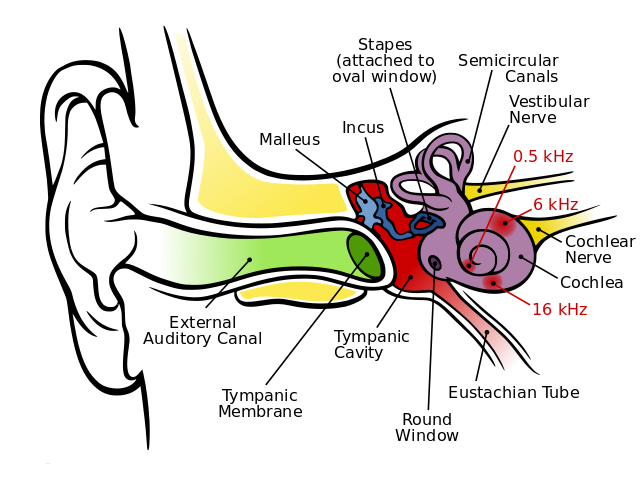
Every single day, untold millions of people around the world are endlessly tortured by noises that no one else can hear.
Some hear high pitched tones, whistles, beeps or clicks. Others hear a whooshing or buzzing noise, like the sound of a jet engine.
But for the unlucky souls who have to live with Tinnitus, the medical term for ringing in the ears, the sound never stops…
And it drives a lot of people crazy.
I should know – I’m one of them, or at least I used to be.
The sound of something wrong:
I’ve had Tinnitus for as long as I can remember.
When I was younger, it never occurred to me that other people couldn't hear the high pitched sound that I could hear when it was quiet. I just thought it was normal and it never really bothered me.
But five years ago it suddenly got a lot worse when I was diagnosed with a rare and incurable inner ear disorder called Meniere’s disease. You probably haven’t heard of it. I hadn’t either. But it’s a particularly nasty condition that causes vertigo, Tinnitus, hearing loss and an uncomfortable feeling of pressure in your ears.
All of a sudden, my Tinnitus was much louder, and layered with low pitched tones and a sound similar to the wind. It made it hard to fall asleep and even harder to focus. The noise steadily added to my already high levels of anxiety.
But fast forward a few years, and I'm happy to report my Tinnitus no longer bothers me at all.
Completely by accident, I stumbled onto a treatment that radically rewired my emotional and physical response to the sound. Almost overnight, it stopped bothering me.
And I know I’m not alone. A lot of people have found ways to live comfortably with their Tinnitus.
So I set out to find out why. I wanted to understand why some people are constantly tortured by their Tinnitus, while other aren’t bothered all.
What I found was not what I expected.
How we hear:
Before any of this can make any sense, you need to understand a few things about how we process sound in the first place.
For the sake of simplicity, we’ll start with the Cochlea. It’s a small, snail-shaped organ in the inner ear that translates the physical vibrations of sound into electrical signals that the brain can understand. These signals are sent as nerve impulses to the auditory cortex, the region of the brain that processes sound, where sounds are identified by matching the electrical patterns with familiar patterns from memory.

In the case of Tinnitus, this is where the problems start. When we experience a new sound, we assign meaning to it and store it away in the recesses of our memory.
On one hand, this plays a role in our survival as a species because we use sound to monitor our environment for threats. For example, if our prehistoric ancestors heard the growl of a saber toothed tiger, the meaning was always clear: danger.
As a result, the growl of a tiger would automatically trigger the fight or flight response.
This panicked and anxious state doesn’t feel very good, but it serves a purpose: it primes the body to react to danger. We can run faster and hit harder. Our senses become heightened.
But it’s not all about threats. Sounds can also carry a deeply positive association. It’s why we feel happy when we listen to certain music and why we find the sounds of nature so relaxing.
So now we have two pieces of the sound puzzle: memory and meaning.
When a sound is important enough, we assign meaning, and we react to the sound in a certain way.
But this reaction can quickly become an automatic conditioned response, activating both the limbic system (emotional response) and our autonomic nervous system (physical response).
It’s why a mother will wake up to the sound of her crying baby, even if she has slept through a noisy storm. It’s why we know the growl of a tiger means danger, and why we suddenly perk up in attention at the sound of our name heard softly across a crowded room.
But it’s also why Tinnitus can become such a problem: when it’s perceived as a threat, the body reacts automatically as if it were in danger, and treats it like one.
The reality, however, is that Tinnitus is no more threatening or dangerous then the sound of a ceiling fan.
What is Tinnitus:
So what exactly is Tinnitus?
The answer starts with a closer look at the Cochlea. Within the Cochlea, sound is transformed into electrical nerve impulses via 17,000 tiny hair-shaped sensory organs, aptly named hair cells.
There is a lot going on inside the Cochlea, and it happens to be a very noisy environment.
All of this physical and electrical activity, combined with the activity of the hair cells as they respond to changes in our sound environment, actually produces measurable noise. The sounds are called Otoacoustic emissions and can be picked up with sensitive microphones.
This is important to understand, because people who don’t have Tinnitus can also hear the sounds of Tinnitus under the right conditions. We’ve known this for decades.
In 1953, two scientists named Heller and Bergman conducted a clever experiment that has been replicated several times. They recruited 80 university students with no history of Tinnitus and led them to believe they were having their hearing tested. Inside of a sound absorbing booth, the students were instructed to press a button whenever they heard any sounds being played through their headphones.
But it was a trick. For 5 straight minutes, no sounds were played. Yet an incredible 93% of the students pressed the button and reported hearing buzzing, pulsing, and whistling sounds.
The exact same sounds reported by Tinnitus sufferers.
Heller and Bergman showed that just about everyone is capable of hearing the background electrical noise present in the Cochlea and in the nerve cells throughout our hearing pathways.
Tinnitus then, is not something dangerous or a sign of internal damage, but the result of our brain turning up the volume of a natural phenomenon in an attempt to compensate for changes in our sound environment like silence, hearing loss, or exposure to sudden noise. Albeit, it’s an overcompensation.
The key take away here, however, is that Tinnitus is a harmless sound.
The difference between someone who is bothered by it and someone who isn’t, is not the volume or the sound itself, but that the sufferer perceives their tinnitus as a threat or an annoyance, and develops a negative conditioned response like panic and anxiety.
How does Tinnitus become such a problem?
The human brain is quite good at eliminating distracting and meaningless background noise from our conscious awareness. It’s why we can focus and get work done in the middle of a noisy coffee shop or an airport. This process is called habituation.

The problem is that it’s simply not possible to habituate any sound that implies a threat. After all, you wouldn’t want to miss the growl of tiger, right?
You can habituate to the sound of your Tinnitus, the people who live comfortably with Tinnitus all have, but you have to defuse your negative association first. Otherwise you will always react automatically as if you were in danger.
It starts with fear:
The negative conditioning usually starts with fear.
The sudden onset of a disturbing noise that no one else can hear is terrifying, especially when you don’t know what’s going on. Many people panic and worry that something is terribly wrong with them.
Most people can tolerate a temporary problem, but if the sound doesn’t go away, the fear continues to build. The sound of silence is also something many people treasure, and grieve for when it’s taken away.
Most people turn to the internet to search for answers, only to find words like “incurable” and “forever".
The panic intensifies as the perceived threat becomes more real and more permanent. The conditioned response grows stronger. Often depression will settle in. Sleep becomes difficult.

And doctors don’t always help. Despite their best intentions, some people end up worse off. So many people are told that they simply have to live with it. This is not constructive advice, or true for that matter.
When faced with such adversity, it’s hard to believe that anyone can learn to live with it. The odds are not in our favor. But it’s the reality that countless people face on a daily basis.
It’s a dark picture, I know. But there is hope for everyone, even in the most extreme cases of Tinnitus.
Solving the problem:
If you are reading this and you have Tinnitus, I’m happy to report that you are already well on your way to relief. Knowledge and understanding is always the first step.
It’s probably not enough to break the negative conditioned response on it’s own, but it’s an important part of the process. Without understanding, we are doomed to relive the vicious cycle, over and over again. Tinnitus and panicked response, ad nauseam.
Finding a doctor, likely an audiologist, who is aware of the various treatment options, one who will leave you with a sense of hopeful optimism, is a top priority. It’s also important to rule out any potentially treatable medical conditions that could be causing your Tinnitus.
But what worked for me was a simple mental exercise I discovered accidentally in the early days of my Meniere’s disease diagnosis.
My symptoms were getting worse and I realized that I needed to be more proactive with my health. My strategy of denial wasn’t working and my stress and anxiety levels were through the roof. Fortunately, I had an old habit to fall back on, meditation.
Earlier in life, meditation had truly helped me with my anxiety. But with my Tinnitus, I found it hard to meditate. I just couldn’t focus on my breath with the sound of the ringing blaring in my ears. It was very frustrating. But while trying to meditate one day, in exasperation I decided to try to focus on the sound of my Tinnitus instead.
It was the one thing my brain and my Tinnitus never expected me to do. And it changed everything for me. My brain started to associate the deep relaxation of meditation with the sound of my Tinnitus.
Over the following few weeks, I was able to habituate completely.
Until science offers us a cure, our Tinnitus will probably never go away.
But that’s okay, because we can habituate. It stops bothering us, and at the end of the day, that’s just as good.
i've had tinnitus all of my life. when i was a kid, i was never afraid of it. it was just that sometimes i wanted some silence. i even underwent the Heller and Bergman test. as i've gotten older i've just gotten used to it. i have even learned to use variations in the sound to identify aspects of the balance of my health. if it gets worse i know i need magnesium. it varies in pitch and volume and from ear to ear. i can hear my internal monitor singing to me. i would never give it up. it helps me be healthy.
Downvoting a post can decrease pending rewards and make it less visible. Common reasons:
Submit
My brother has suffered from tinnitus for the past 10 years. He has tried everything and nothing makes a difference. As you stated, stress makes it worse, so he does everything he can to keep his stress level down. I know how difficult this has been for him, so I feel for all of you who suffer from tinnitus.
Downvoting a post can decrease pending rewards and make it less visible. Common reasons:
Submit
When it get's to that point, it can be so hard to live with. Do you know what caused your brothers Tinnitus @norene? I will say this though. I know many people who have habituated who had excruciatingly loud, torturous Tinnitus. They all say the same thing (me included), that when it was at it's worst, it so very bad. But that after they habituated, it sort of just faded out of their awareness. They still hear it, but it stopped bothering them.
Downvoting a post can decrease pending rewards and make it less visible. Common reasons:
Submit
Both my eardrums collapsed when I was 5 years old, which prompted the need for tubes. That, coupled with chronic ear infections over the years, has rendered poor hearing, as well as constant tinnitus. I've just gotten used to it.
DJing for 10 years likely didn't help.
Downvoting a post can decrease pending rewards and make it less visible. Common reasons:
Submit
@winstonwolfe do you have other vestibular symptoms as well? (Like vertigo/dizziness/light headedness/ect)
Downvoting a post can decrease pending rewards and make it less visible. Common reasons:
Submit
No, nothing like that. Honestly it's just part of the background noise.
Downvoting a post can decrease pending rewards and make it less visible. Common reasons:
Submit
Glad to hear it!
Downvoting a post can decrease pending rewards and make it less visible. Common reasons:
Submit
Great post! A combo of playing bass in rock bands, clubbing, using power tools scuppered my hearing, and brought on tinnitus a few years back. Its something that you have to process, deal with, and then live with. If it all gets too much, then putting on some music helps. I dont notice it much these days - it really does get better with time and positive mental attitude.
Downvoting a post can decrease pending rewards and make it less visible. Common reasons:
Submit
That's great it sounds like you've habituated. Over time, a lot of people do habituate naturally.
Downvoting a post can decrease pending rewards and make it less visible. Common reasons:
Submit
My SO, @airkooledkustoms has also had Tinnitus for a long, long time. We sleep with ambient music on most nights because it seems to somehow equalize the tone and get it to hush.
Do you also hear "The Hum"? http://www.thehum.info
He has, off and on throughout the years, somewhat depending on where he was living at the time.
MMJ also seems to help!
Downvoting a post can decrease pending rewards and make it less visible. Common reasons:
Submit
Sound masking is a pretty common approach to managing the Tinnitus. I've slept with a sound machine my whole life. Definitely makes it way easier to fall asleep, though I can fall asleep without it now that I've habituated. And no I don't also hear the hum, but I have heard of it.
Downvoting a post can decrease pending rewards and make it less visible. Common reasons:
Submit
That's great info and I've never heard it explained this way before. This makes sense. I've had it all my life and I've been just living with it but paying more attention to it lately.
Downvoting a post can decrease pending rewards and make it less visible. Common reasons:
Submit
I'm glad you found it interesting! I have a book coming too out on all of this stuff that goes into way more detail. I've found all kinds of ways to speed up the habituation process!
Downvoting a post can decrease pending rewards and make it less visible. Common reasons:
Submit
Sadly though, many of the young headphone generation don't know what us rock fans know about tinnitus.
Downvoting a post can decrease pending rewards and make it less visible. Common reasons:
Submit
Actually, the young generation has been hit the hardest believe it or not. 1 in 5 american teens has some degree of hearing loss/tinnitus because of headphones.
Downvoting a post can decrease pending rewards and make it less visible. Common reasons:
Submit